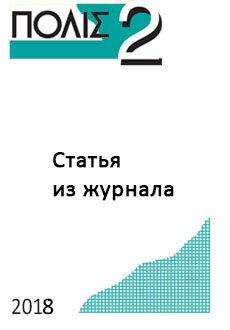Online shop of "Polis. Political Studies" Journal
We in the world, the world in us
Melnikov S.S. In-Group and Out-Group in Russian Political Cartoons: Research of the Latent Meanings of Narrative Conflict between Russia and the West. – Polis. Political Studies. 2018. No 2. P. 100-114 (In Russ.)
150 руб.
political cartoon; political humor; identity; in-group; out-group; Russia; the West; content analysis; visual image.
The article examines the invariant contents of Russian political cartoons, the representation of actual political processes in it and, most significantly, the implicit or masked aspects of sociopolitical life identified via content analysis of the caricature image. The author claims that the virtualization of politics has given humor an additional significance for contemporary political discourse. Despite the emergence of new genres, professional cartoons in the media are still the static-visual humor direction most in demand. Plots of political cartoons as well as of political humor in general often reflect conflict episodes of the relationship between in-group (for the artist and audience) and out-group. This is also true for the Russian cartoons, given the relatively high importance of state, cultural and national identity for Russian collective identity. As shown by the comparative-historical analysis, the representation of conflicts between Russians as in-group and the West / representatives of Western societies as out-group is typical for Russian cartoons. The profound meanings of the reflection of Russian cartoonists over this antagonism and the dynamics of the concentration on it are studied by the method of content analysis. This study revealed that since the “perestroika” time the interest to represent Western political actors in cartoons has decreased – the domestic events and processes became a priority. The attractiveness of the in-group representation declines over time, which indicates a more critical attitude to the Russian internal problems. With a greater overall attractiveness of Russian in-group, it is important to note that, as a result of content analysis, out-group representatives are shown as more impressive and presentable. The transfer of the in-group and the out-group antagonism from the foreign policy field to the internal policy field which is characteristic of the last decades, coupled with the polar ideological orientation of contemporary Russian cartoonists (including the attitude toward the West), indicates a low consolidation of Russian society.
 English
English Русский
Русский

Reviews
There are no reviews yet.